- Home
- Muriel Spark
The Ballad of Peckham Rye Page 4
The Ballad of Peckham Rye Read online
Page 4
But in the meantime when Dougal, at the end of his second week at Miss Frierne’s, said, ‘You must have had some courting days,’ she turned her narrow pale face away from him and indicated by various slight movements of her bony body that he had gone too far.
Eventually she said, ‘Did Humphrey come in with you?’
‘No, I left him round at Dixie’s.’
‘I wanted to ask his private advice about something.’
‘Anything I can do? I give rare advice.’
She was still offended. ‘No, thank you. I wish to ask Humphrey privately. Do I hear rain?’
Dougal went to bed and the rain danced on the roof above his head. A key clicked in the front door and Humphrey’s footsteps, climbing carefully, rose to the first landing. Humphrey paused on the landing, a long pause, as if he were resting from some effort. Then Humphrey’s step fumbled up on the second flight. Either he was drunk or carrying a heavy weight, for he staggered at the top, just outside Dougal’s door.
The long cupboard in Dougal’s bedroom gave out a loud tom-tom as the rain beat on the low roof within, and together with this sound was discernible that of Humphrey staggering along the short passage to his own room.
Dougal woke again at the very moment, it seemed, that the rain stopped. And at this very moment a whisper and a giggle came from the direction of his cupboard. He switched on his light and got up. The cupboard was empty. Just as he was going to shut the small door again, there was a slight scuffle. He opened the door, put his head in, and found nothing. He returned to bed and slept.
On Monday morning Dougal got his letter. Jinny had finished with him. He went into the offices of Meadows, Meade & Grindley and typed out some of his notes. Then, at the morning tea-break, he walked over to the long, long factory canteen and asked especially for Odette Hill and Lucille Potter. He was told they were not at work that morning. ‘Taking the day off. Foreman’s mad. Absenteeism makes him mad.’ He had a bun and a cup of tea, then another bun. A bell rang to mark the end of the tea-break. The men disappeared rapidly. A few girls loitered, as on principle, talking with three of the women who served the canteen. Dougal put his head on his arms in full view of these few girls, and wept.
‘What’s the matter with him?’
‘What’s the matter, son?’ said a girl of about sixteen whom Dougal, on looking up, found to be Dawn Waghorn, one of the cone-winders whose movements when winding the cone, as laid down by the Cambridge expert, had seemed to Dougal, when he had been taken round the floors, very appealing. Dougal put down his head and resumed his weeping.
Dawn patted his poor shoulder. He slightly raised his head and shook it sadly from side to side. A woman came round from the canteen bar with a clean-folded oven cloth which she held out to him. ‘Here, dry your eyes before anyone sees you,’ she said.
‘What’s the matter, mate?’ said another girl. She said, ‘Here’s a hanky.’ She was Annette Wren who was in training for seaming. She was giggling most heartlessly.
‘I’ve lost my girl,’ Dougal said, as he blew his nose on the oven cloth.
Elaine Kent, who was well on in her twenties, an experienced controller of process, turned on Annette Wren and told her to shut her mouth, what was there to laugh at?
The two other canteen women came round to Dougal, and he was now surrounded by women. Elaine Kent opened her bag and took out a comb. With it she combed Dougal’s hair as it moved with his head slowly from side to side.
‘You’ll get another girl,’ said one of the canteen women, Milly Lloyd by name.
Annette giggled again. Dawn slapped her face and said, ‘You’re ignorant. Can’t you see he’s handicapped?’
Whereupon Annette burst into tears.
‘Keep your head still,’ said Elaine. ‘How can I comb you if you keep moving your head?’
‘It calms you down, a good comb,’ remarked one of the canteen.
Milly Lloyd was looking for a fresh handkerchief for Annette whose sobs were tending towards the hysterical.
‘How did you lose your girl?’ said Dawn.
‘I’ve got a fatal flaw,’ Dougal said.
Dawn assumed this to be his deformed shoulder, which she now stroked. ‘It’s a shame,’ she said. ‘little no-good bitch I bet she is.’
Suddenly Merle Coverdale appeared at the door in the long distance and started walking towards the group.
‘Office,’ whispered Milly, ‘typing pool,’ and returned behind the canteen bar.
Merle shouted along the length of the canteen as she approached. ‘Tea for Mr Druce, please. He was out. Now he’s come in. He wants some tea.’ Then she saw the group round Dougal. ‘What the hell’s going on?’ she said.
‘Migraine,’ Dougal said sadly. ‘A headache.’
‘You should all be back on the floor,’ Merle said to the girls. ‘There’s going to be trouble.’
‘Who you to talk to us like that?’
‘Who’s she, coming it over us?’
And so Merle could do nothing with them. She said meaningfully to Dougal,
‘I had a headache myself this morning. Came into work late. I went for a brisk walk on the Rye. All by myself.’
‘I dimly recall arranging to meet you there,’ Dougal said. ‘But I was prevented.’
Merle gave him a hostile look and said to the canteen women, ‘What about that tea?’
Milly Lloyd put a cup of tea into Dougal’s hand. Merle walked off, bearing Mr Druce’s tea, moving her neck slightly back and forth as she walked all the long length of the canteen. Annette took a cup of tea and, as she gulped it, tried also to express her rage against the girl who had slapped her. As Dougal sipped his tea, young Dawn stroked his high shoulder and said, never mind, it was a shame, while Elaine combed his hair. It was curly hair but cut quite short. Nevertheless she combed it as if it had been as long as the Laughing Cavalier’s.
Dixie sat with Humphrey, Dougal, and Elaine Kent in Costa’s Café. Dixie yawned. Her eyes were sleepy. The only reason she had denied herself an early night was that Dougal was paying for the supper.
‘I’ve felt tired all day,’ she said. She addressed the men, ignoring Elaine as she had done all evening, because Elaine was factory, even though Elaine was high up in process-control. After a trial period Elaine likewise confined her remarks to the men.
‘Look what’s just come in,’ Elaine said. Tall Trevor Lomas had just come in. He sat at the nearest table, with his head and shoulders turned away from Dougal’s party, and stared out of the window. Trevor Lomas was at this time employed as an electrician by the Borough.
Trevor turned his head sleepily and permitted an eye to rest on Humphrey for a small second. Humphrey said ‘Hallo.’ Trevor did not reply.
Trevor’s girl arrived presently, tall and copper-tinted, with a tight short black skirt and much green eye-shadow. ‘Hi, snake,’ said Trevor. ‘Hi,’ said the girl, and sat down beside him.
Dixie and Elaine stared at the girl as she slid out of her coat and let it fall on the back of her chair. They stared as if by duty, and watched every detail. The girl was aware of this, and seemed to expect it.
Then Trevor pushed back his chair, still seated, so that he half-faced Humphrey’s party. He said to his girl in a loud voice: ‘Got your lace hanky on you, Beauty?’
Beauty did not reply. She was holding up a small mirror, putting on lipstick with care.
‘Because,’ said Trevor, ‘I’m going to cry.’ He took his large white handkerchief out of his top pocket and flourished it before each eye in turn. ‘Going to cry my eyes out, I am,’ said Trevor, ‘because I’ve lost me girl. Hoo, I’ve lost me girl.’
Beauty laughed a great deal. The more she laughed the more noisily did Trevor continue. He laid his head on the table and affected to sob. The girl rocked in her chair, her newly painted lips open wide apart.
Then Dixie started to laugh.
Dougal shoved his chair back and stood up. Elaine jumped up and held his arm.
‘Let be,’ she said.
Humphrey, whom the story of Dougal’s weeping in the canteen had not yet reached, said to Dixie, ‘What’s up?’
Dixie could not tell him for laughing.
‘Let be, mate,’ Elaine said to Dougal.
Dougal said to Trevor, ‘I’ll see you up on the Rye outside the tennis court.’
Elaine walked over to Trevor and gave him a push. ‘Can’t you see he’s deformed?’ she said. ‘Making game of a chap like that, it’s ignorant.’
Dougal, whose deformed shoulder had actually endowed him with a curious speciality in the art of fighting, in that he was able to turn his right wrist at an extraordinary back-hand outward angle and to get a man by the throat as with a claw, did not at that moment boast of the fact.
‘Cripple as I am,’ he merely said, ‘I’ll knock his mean wee sex-starved conceited low and lying L.C.C. electrician’s head off.’
‘Who’s sex-starved?’ Trevor said, standing up.
Two youths who had been sitting by the window moved over the better to see. A Greek in an off-white coat appeared, and pointed to a telephone receiver which stuck out of the wall behind him in the passageway to the dim kitchen.
‘I’ll use that phone,’ he said.
Trevor gave him one of his long sleepy looks. Then he gave one of them to Dougal.
‘Who’s sex-starved?’ he said.
‘You are,’ Dougal said, while counting his money to pay the bill. ‘And I’ll see you on the Rye within the quarter hour.’
Trevor walked out of the café and Beauty hastily wriggled into her coat and tripped out after him. After them both went the Greek, but Trevor’s motor-scooter had just moved off.
‘Hasn’t paid for coffee,’ said the Greek, returning. ‘What name and address he is, please?’
‘No idea,’ Dougal said. ‘I don’t mix with him.’
The Greek turned to Humphrey, ‘I seen you here before with that fellow.’
Humphrey threw half a crown on the table, and, as the four departed, the Greek slammed his glass doors behind them as hard as he judged the glass would stand up to.
The two girls got into Humphrey’s car, but he at first refused to drive them up to the Rye. Dougal stood and argued on the pavement.
Humphrey said, ‘No, not at all. Don’t go. Don’t be a fool, Dougal. Let it pass. He’s ignorant.’
‘All right, I’ll walk,’ Dougal said.
‘I’m going to send Trevor Lomas home,’ Humphrey said. He left Dougal and started up the car and drove off with the girls, Dixie in front and Elaine behind agitating, too late, to be let out.
Dougal arrived at the tennis courts six minutes later. Some seconds before he arrived he had heard a sound as of women screaming.
Between two distant lamp-posts, in their vague oblique light, a group was gathered. Dougal discerned Humphrey and Trevor with a strange youth called Collie who was without a coat and whose shirt was unbuttoned, exposing his chest to the night air. These figures were apparently molesting three further figures who turned out to be Dixie, Elaine, and Beauty, who were screaming. Soon it appeared that the men were no” molesting but restraining them. Dixie had a long-strapped shoulder bag with which she was attempting to lay about her, largely in the direction of Elaine. Elaine, who was at present in the grip of Trevor, managed to dig Beauty’s leg with her steel stiletto heel. Beauty wailed and struggled in Humphrey’s grip.
‘What’s going on?’ Dougal said.
Nobody took any notice of him. He went and hit Trevor in the face. Trevor let go of Elaine so that she fell heavily against Beauty. Meanwhile Trevor hit out at Dougal, who staggered backwards into Humphrey. Beauty wailed louder, and struggled harder. Elaine recovered herself and used her freedom to kick with her stiletto heel at Trevor. Dixie, meanwhile, was attempting to release herself from the grasp of that strange youth, Collie, with the bared chest, by biting the arm that held her. The screams grew louder. Dougal’s eyes were calculating his chance of coming to adequate terms with Trevor Lomas amidst the confusion when a curious thing happened.
The confusion stopped. Elaine started to sing in the same tone as her screaming, joylessly, and as if in continuation of it. The other girls, seeming to take a signal from her, sidled their wails into a song,
‘Sad to say I’m on my way,
I got a little girl in Kingston Town’
meanwhile casting their eyes fitfully over the Rye beyond the trees.
The strange youth let go of Dixie and began to jive with Elaine. In a few seconds everyone except Dougal was singing, performing the twisting jive, merging the motions of the fight into those of the frantic dance. Dougal saw Humphrey’s face as his neck swooped upwards. It was frightened. Dixie’s expression was, with a decided effort, bright. So was Elaine’s. A one-sided smile on the face of the strange boy, and the fact that, as he bent and twisted in the jive, he buttoned up his shirt, made Dougal look round outside the group for the cause of this effect. He saw it immediately. Two policemen were quite close to them now. They must have been observed at a distance of three minutes’ police-pace when Elaine had started to sing and the signal had gone round.
‘What you think this is — a dance hall?’
‘No, constable. No, inspector. Just having a dance with the girls. Just going home, mate.’
‘Well, go home. Get a move on. Out of the park, the lot of you.’
‘It was Dixie,’ said Humphrey to Dougal on the way home, ‘that started the fight. She was over-tired and worked up. She said that tart of Trevor’s was giving her looks. She went up to the girl and said, “Who you looking at?” and then the girl did give her a look. Then Dixie let fly with her handbag. That’s how it all began.’
Rain started to fall as they turned up past the old Quaker cemetery. Nelly Mahone took a green-seeming scarf from a black bag and placed it over her long grey hair. She cried: ‘The meadows are open and the green herbs have appeared, and the hay is gathered out of the mountain. The wicked man fleeth when no man pursueth, but the just, bold as a lion, shall be without dread.’
‘Pleasant evening, though a bit wet,’ Dougal said.
Nelly looked round after him.
Up in his room Dougal poured Algerian wine and remarked as he passed a glass to Humphrey,
‘The cupboards run the whole length of the attic floor.’ Humphrey put the glass on the floor at his feet and looked up at Dougal.
‘There was a noise in the cupboard,’ Dougal said, ‘the night before last. It went creak-oop, creak-oop. I thought it came from my cupboard here, but I think maybe it didn’t. I think maybe it came from your cupboard through the wall. Creak-oop.’ Dougal bent his knees apart, then sprang up in the air. He repeated this several times. ‘Creak-oop,’ he said.
Humphrey said, ‘It’s only on wet Saturday nights when we can’t go up on the Rye.’
‘Isn’t she heavy to carry upstairs?’ Dougal said.
Humphrey looked alarmed. ‘Did it sound as if I was carrying her upstairs?’
‘Yes. Better to let her walk up in her stockinged feet.’
‘No, she did that once. The old woman came out and nearly caught us.’
‘Better to lie in the bed than in the creaky cupboard,’ Dougal said. ‘The chap in the room below will hear it.’
‘No, the old woman came up one night when we were in the bed. We were nearly caught. Dixie had to run and hide in the cupboard.’
Humphrey lifted his glass of wine from the floor by his feet and drank it in one gulp.
‘Don’t worry yourself,’ Dougal said.
‘It’s a worry what to do. All right on fine Saturday nights; we can go up on the Rye and Dixie gets home about half past eleven. But if it starts to rain we come back here. I don’t see why not, I pay for the room. But there’s the difficulty of getting her up, then down again in the morning while the old woman’s at early church. Then she has to pay her brother Leslie five shillings a time to let her in quietly. And she worries about that, does Dixie. She’s a
great saver, is Dixie.’
‘It’s a tiring occupation, is saving,’ Dougal said. ‘Dixie’s looking tired.’
‘Yes, as a matter of fact she does lie awake worrying. And there’s no need to worry. Terrible at seventeen. I said, “What you think you’ll be like in ten years’ time?”‘
‘When are you getting married?’ Dougal said.
‘September. Could do before. But Dixie wants a certain sum. She has her mind set to a certain sum. It keeps her awake at night.’
‘I advised her to take Monday morning off,’ Dougal said. ‘Everyone should take Mondays off.’
‘Now I don’t agree to that,’ Humphrey said. ‘It’s immoral. Once you start absenting yourself you lose your self-respect. And you lose the support of your unions; they won’t back you. Of course the typists haven’t got a union. As yet.’
‘No?’ said Dougal.
‘No,’ Humphrey said, ‘but it’s a question of principle.’
Dougal bent his knees apart as before and leapt into the air. ‘Creak-oop, creak-oop,’ he said.
Humphrey laughed deeply with his head thrown back. He stopped when a series of knocks started up from the floor.
‘Chap downstairs,’ Dougal said, ‘knocks on his ceiling — with a broom handle. He doesn’t like my wee dances.’ He performed his antic three times more, shouting, ‘Creak-oop.
Humphrey cast his head back and laughed, so that Dougal could see the whole inside of his mouth.
‘I have a dream at nights,’ Dougal said, pouring the wine, ‘of girls in factories doing a dance with only the movements of their breasts, bottoms, and arms as they sort, stack, pack, check, cone-wind, gum, uptwist, assemble, seam, and set. I see the Devil in the guise of a chap from Cambridge who does motion-study, and he’s the choreographer. He sings a song that goes, “We study in detail the movements requisite for any given task and we work out the simplest pattern of movement involving the least loss of energy and time.” While he sings this song, the girls are waggling and winding, like this —‘ and Dougal waggled his body and wove his arms intricately. ‘Like Indian dancing, you know,’ he said.

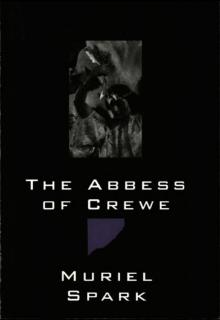 The Abbess of Crewe: A Modern Morality Tale
The Abbess of Crewe: A Modern Morality Tale Reality and Dreams
Reality and Dreams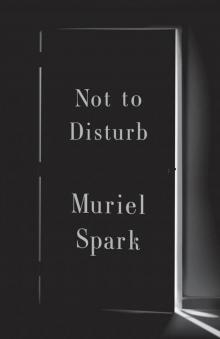 Not to Disturb
Not to Disturb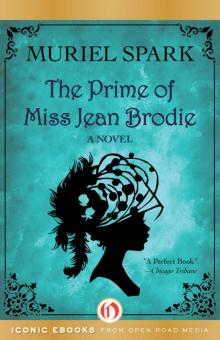 The Prime of Miss Jean Brodie
The Prime of Miss Jean Brodie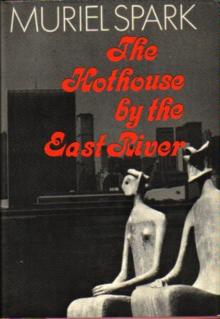 The Hothouse by the East River
The Hothouse by the East River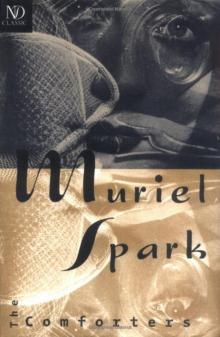 The Comforters
The Comforters (1958) Robinson
(1958) Robinson Unknown
Unknown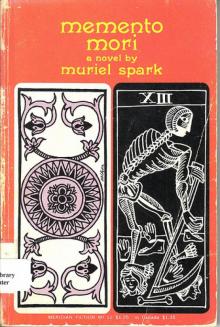 Memento Mori
Memento Mori The Finishing School
The Finishing School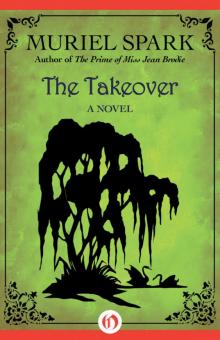 The Takeover
The Takeover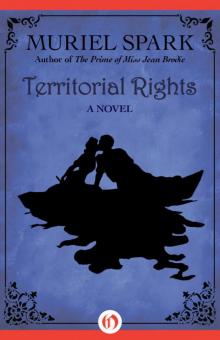 Territorial Rights
Territorial Rights The Complete Short Stories
The Complete Short Stories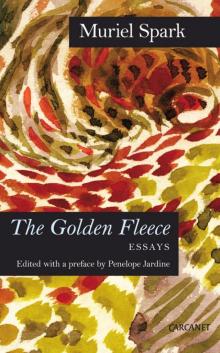 The Golden Fleece: Essays
The Golden Fleece: Essays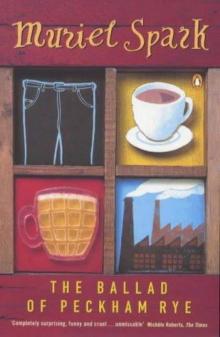 The Ballad of Peckham Rye
The Ballad of Peckham Rye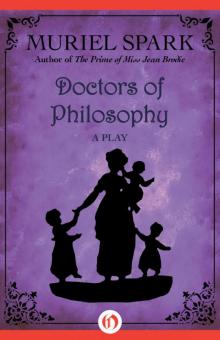 Doctors of Philosophy: A Play
Doctors of Philosophy: A Play The Mandelbaum Gate
The Mandelbaum Gate Loitering With Intent
Loitering With Intent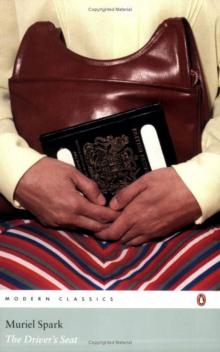 The Driver's Seat
The Driver's Seat Complete Poems: Muriel Spark
Complete Poems: Muriel Spark Symposium
Symposium Aiding and Abetting
Aiding and Abetting The Golden Fleece
The Golden Fleece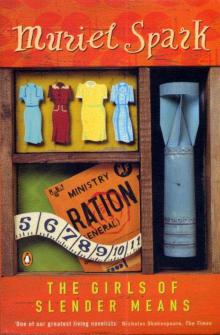 The Girls of Slender Means
The Girls of Slender Means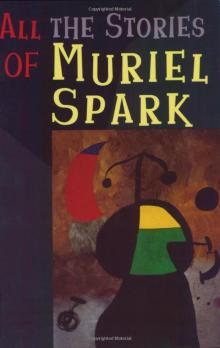 Alice Long’s Dachshunds
Alice Long’s Dachshunds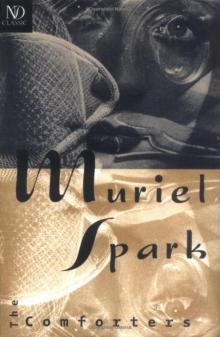 (1954) The Comforters
(1954) The Comforters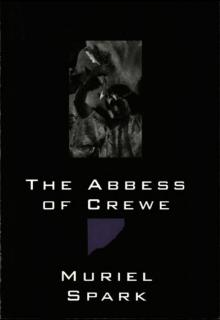 The Abbess of Crewe
The Abbess of Crewe Curriculum Vitae
Curriculum Vitae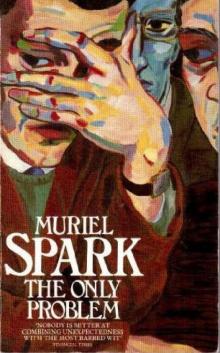 The Only Problem
The Only Problem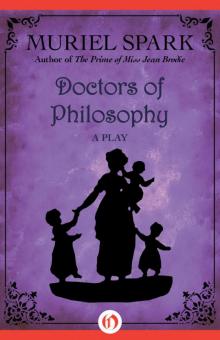 Doctors of Philosophy
Doctors of Philosophy